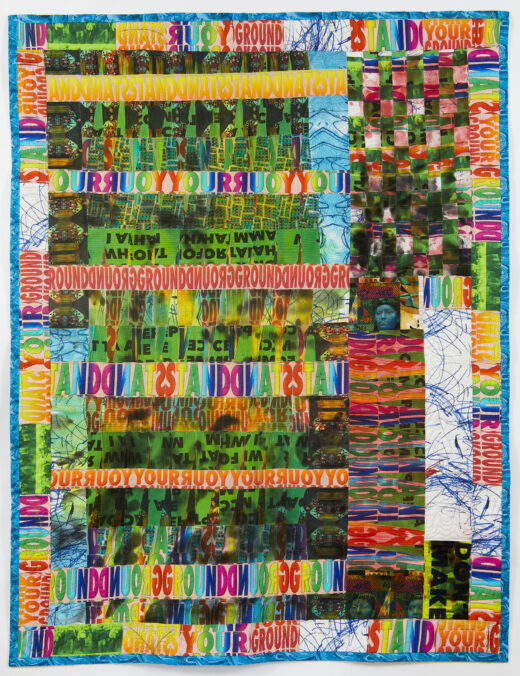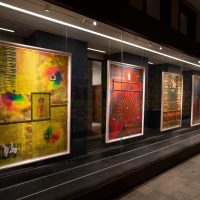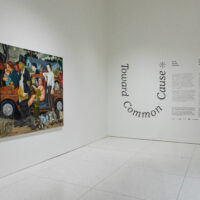Relational Futures: A Symposium for Indigenous Land, Water, and Environment

October 7–9, 2021
Hybrid program, consisting of on-site experiences and livestream broadcasts
About
For whom have environments been protected, conserved, or honored? The prolonged impacts of environmental racism and settler colonialism, exacerbated by infrastructural and economic inequalities are realities shared by communities of color and Indigenous nations. How have notions of the commons and public lands, so central to environmental discourse in the United States, been used to simultaneously dispossess Indigenous territory and advance ideologies of conservation and protection? In light of the historical trajectory of these claims, catastrophic climate change, and ongoing global pandemic, how are Indigenous communities responding to and asserting their relationships to land and environment? Building and imagining more sustainable relationships with our environments, one another, and our other-than-human kin is crucial to our collective survival.
Inspired by the more than two dozen artistic collaborations featured in the exhibition Toward Common Cause: Art, Social Change, and the MacArthur Fellows Program at 40 at the Smart Museum of Art at the University of Chicago—including work by Jeffrey Gibson, Iñigo Manglano-Ovalle, Fazal Sheikh, LaToya Ruby Frazier, and Mel Chin—Relational Futures offers a platform for dialogue around Indigenous environmental advocacy and research in the context of enduring legacies of toxic exposure, resource extraction, and global public health crisis.
Bringing together Indigenous scholars, activists, and policymakers from the Indigenous Southwest to the Indigenous Midwest, this three-day program is open to all students, faculty, staff, and community members with the intention of building solidarity around our common commitments to environmental stewardship and relational care.
FREE, open to the public. Space is limited for in-person gatherings. Please review the schedule below and register in advance.
Relational Futures is presented in conjunction with the D’Arcy McNickle Distinguished Lecture series at the Newberry Library and the Film Studies Center at the University of Chicago, with additional support from the Center for Native American and Indigenous Research at Northwestern University and the Center for the Study of Race, Politics, and Culture at the University of Chicago.
Schedule
Keynote by Deborah McGregor, Anishinaabe
“Storytelling, Climate Justice, and Self-Determined Indigenous Futures”
Thursday, October 7, 6 pm
Virtual event • Register for webinar link • Stream live via YouTube
What does it mean to “live well” with the Earth in the face of climate/ecological crisis? What does a self-determined climate future look like for Indigenous communities and peoples? Indigenous-derived solutions must be generated based on knowledge systems which have fostered Indigenous survival despite centuries of environmental upheaval affected by colonization. Deborah McGregor opens Relational Futures with the D’Arcy McNickle Distinguished Lecture at the Newberry Library. This talk will capture desired ‘Indigenous climate change futures’ described by Elders and other knowledge holders, shared through peer-reviewed journal articles, workshops, podcasts, videos, a website, and presentations.
Register for the webinar link
Symposium
Friday, October 8, 10 am–4:30 pm • Register to attend in person
The University of Chicago, Logan Center for the Arts, Performance Penthouse, 915 E 60th Street, Chicago, IL 60637
10 am
Welcome and Introductions by co-organizers
- Teresa Montoya (Diné), Provost’s Postdoctoral Fellow and incoming Assistant Professor of Anthropology, University of Chicago
- Rose Miron, Director of the D’Arcy McNickle Center for American Indian and Indigenous Studies, Newberry Library
- Blaire Topash-Caldwell (Pokagon Band of Potawatomi Indians), Assistant Professor of Anthropology, University of Massachusetts Boston
10:30 am–noon
Environmental Justice in the Indigenous Midwest
The Great Lakes in the Midwest of the United States holds twenty percent of the world’s fresh water and supplies ninety-five percent of the freshwater in the country. In tandem with westward expansion and American development that clear-cut Michigan’s forests in the nineteenth and twentieth centuries as well as drained wetlands in the Midwest, the Great Lakes in particular became highly polluted with toxic metals, raw sewage, and higher temperatures which, in turn, depleted many of the Great Lakes fish and waterfowl species. Since the 1950s Lake Erie has been so badly contaminated due to oil spills and legal and illegal dumping, resulting in beach closings and fish that are too toxic to eat, that it is called a “dead” lake. Despite some attempts to mitigate further damage to the Great Lakes via 1970s Environmental Protection Agency policies and international agreements with Canada, oil spills continue to be an issue in the midwest region. In July of 2010, an Enbridge pipeline burst in a tributary near the Kalamazoo River in Michigan. It is known as one of the largest inland oil spills in U.S. history and a significant portion of the contamination reached within several miles of Anishinaabe reservation and trust lands. In recent years tribes in the midwest have leveraged their traditional knowledge to develop more robust ecological revitalization projects on and near tribal lands. As part of this work, knowledge holders and Indigenous environmental specialists provide education around Indigenous stewardship strategies and the revitalization of traditional foods such as manoomin (wild rice). This panel brings together several Anishinaabe scholars and community members who are pivotal to this work so that they may share their experiences of protecting their homelands in the Midwest.
- Roger LaBine (Lac Vieux Desert Band of Lake Superior Chippewa), Water Resource Technician, Lac Vieux Desert Band of Lake Superior Chippewa
- Michael Wassegijig Price (Wikwemikong First Nation), Traditional Ecological Knowledge Specialist at Great Lakes Indian Fish & Wildlife Commission
- Deondre Smiles (Leech Lake Band of Ojibwe), Assistant Professor of Geography, The University of Victoria
- Moderator: Blaire Topash-Caldwell (Pokagon Band of Potawatomi Indians), Assistant Professor of Anthropology, University of Massachusetts Boston
1–2:30 pm
Nuclear Legacies from UChicago to Diné Bikéyah
On December 2, 1942, scientists at the University of Chicago achieved the first self-sustained nuclear chain reaction—the legacy of this event continues to have lasting impacts in the Indigenous Southwest. From 1944 to 1986, an estimated 30 million tons of uranium ore were extracted from Navajo homelands. As a result, there are currently over 500 abandoned uranium mines (AUMs), not to mention the countless homes, grazing lands, and water sources that are contaminated with elevated levels of radiation. Although the Navajo Nation has since banned the mining and processing of uranium with the passage of the Diné Natural Resources Protection Act of 2005, the toxic legacy of these extractive industries remains. This roundtable panel brings together Diné scholars and environmental advocates to consider the broader impacts of resource extraction and its implications for green energy initiatives on the Navajo Nation and beyond.
- Talia Boyd (Diné), Cultural Landscapes Manager, Grand Canyon Trust
- Andrew Curley (Diné), Assistant Professor, School of Geography, Development & Environment, The University of Arizona
- Tommy Rock, (Diné), Postdoctoral Research Associate, Department of Geosciences, Princeton University
- Moderator: Teresa Montoya (Diné), Provost’s Postdoctoral Fellow and incoming Assistant Professor of Anthropology, University of Chicago
3–4:30 pm
Water Security and Relationality
Indigenous peoples in settler-colonial countries such as the United States experience acute disparities concerning drinking water insecurity stemming from disputes over rights and jurisdiction, inconsistent regulation, lack of dependable infrastructures, and scarcity due to climate change. As a result, Native American households are 19 times more likely than White households to lack indoor plumbing. In this way, water insecurity has also made Indigenous peoples more vulnerable to COVID-19 transmission. In this panel, Indigenous scholars and water rights advocates working across various tribal and institutional contexts will discuss Indigenous approaches to tribal resource management, water security, and the application of Indigenous knowledge in regulatory and governance contexts.
- Grace Bulltail (Crow Tribe/Descendent of the Mandan, Hidatsa, and Arikara Nation), Assistant professor, Nelson Institute for Environmental Studies, University of Wisconsin-Madison
- Rochelle Diver (Lake Superior Ojibwe), Independent Consultant, International Indian Treaty Council
- Janene Yazzie (Diné), Co-Founder, Sixth World Solutions
- Moderator: Kyle Whyte (Citizen Potawatomi Nation), George Willis Pack Professor of Environment and Sustainability, University of Michigan
Register for the panel discussions
Film Program
Public Trust: A Dialogue on Sacred Lands, Outdoor Recreation, and Indigenous Stewardship
Friday, October 8, 7 pm • Register to attend the film program
The University of Chicago, Logan Center for the Arts, Film Screening Room, 915 E 60th Street, Chicago, IL 60637
As an extinction crisis looms and climate change continues to be one of the greatest threats our planet has ever faced, America’s 640 million acres of public lands support biodiversity and carbon sequestration. It’s essential that we fight for their protection by preventing the slashing of the Bears Ears National Monument in Utah, fighting the potential permanent destruction of the Boundary Waters Canoe Area Wilderness in Minnesota, and stopping the de facto sale of the Arctic National Wildlife Refuge. Public Trust (2020), an award-winning documentary film by David Garrett Byars, follows three geographically distinct, though interrelated, public lands struggles. The stakes, as this film illustrates, are more pressing than ever. Hosted by UChicago’s Film Studies Center and Cinema and Media Studies, this screening will be followed by a discussion around the legacy of public lands appropriation and the role of Indigenous activism in reminding us whose lands we are fighting to protect.
- Angelo Baca (Diné/Hopi), Ph.D. Candidate in Anthropology, New York University and the Cultural Resources Coordinator at Utah Diné Bikéyah
- Ashleigh Thompson (Red Lake Ojibwe), Ph.D. Candidate in Anthropology, The University of Arizona
- Jeremy Hunter Rubingh, producer, Public Trust
- Moderator: Teresa Montoya (Diné), Provost’s Postdoctoral Fellow and incoming Assistant Professor of Anthropology, University of Chicago
Register for the film program
Exhibition tour
Saturday, October 9, 10 am–noon • Register to attend the tour
The University of Chicago, Smart Museum of Art, 5550 S. Greenwood Avenue, Chicago, IL 60637
Coffee and refreshments followed by a tour of Toward Common Cause led by Abigail Winograd, MacArthur Fellows Program Fortieth Anniversary Exhibition Curator, and exhibiting artist Iñigo Manglano-Ovalle.
Register for the exhibition tour
Panelists and presenters
Angelo Baca is a Diné and Hopi cultural activist, filmmaker, and educator. He is a Ph.D. Candidate in Anthropology at New York University and also the Cultural Resources Coordinator at Utah Diné Bikéyah, an Indigenous nonprofit organization dedicated to protecting culturally significant ancestral lands. He is the director and producer of the award-winning documentary film titled Shash Jaa’: Bears Ears (2016) that follows members of a unique tribal coalition in their fight to protect sacred land from resource extraction through a national monument designation campaign. The National Parks Conservation Association recently named him as one of “10 Under 40” dynamic cultural activists who make up the association’s Next Generation Advisory Council. He currently lives in San Juan County, UT, and regularly runs the trails of Bears Ears.
Talia Boyd currently works as Cultural Landscapes Manager for the Grand Canyon Trust. She was born and raised in the Navajo Nation, growing up with a respect for the natural world through traditional Diné teachings. The dewatering of aquifers through the extraction of non-renewable energies and the alarming legacy of abandoned uranium mines throughout her homeland drove Talia to take action to protect her communities on the Colorado Plateau. Talia has spent years grassroots organizing in rural and Indigenous communities on environmental and social justice issues. Some of her work has included community radio production, working closely with communities to address uranium legacy issues, the protection of sacred landscapes, and supporting Indigenous voting rights.
Grace Bulltail is an Assistant Professor in the Nelson Institute for environmental studies at the University of Wisconsin-Madison. Originally from Montana, she is a member of the Crow Tribe and a descendant of the Mandan, Hidatsa, and Arikara Tribes of Fort Berthold, North Dakota. She completed a doctoral degree in biological & environmental engineering at Cornell University. Dr. Bulltail’s research lab group focuses on natural and water resource management, land use, and resource sovereignty in Indigenous communities. Grace’s scholarship is informed by her work as a professional engineer on water resources infrastructure for tribal communities. Grace is currently a member of the American Indian Science & Engineering Society board of directors and is a professional engineer licensed in the state of California.
Andrew Curley is an Assistant Professor in the School of Geography, Development & Environment at The University of Arizona. His research focuses on the everyday incorporation of Indigenous nations into colonial economies, analyzing how Indigenous nations continue to thrive despite decades of forced removal, land dispossession, and economic underdevelopment. Within Indigenous communities, he investigates how extractive industries produce a particular kind of colonizing relationship that expands social difference and creates new cultural understandings of resources. Building on ethnographic research, his publications speak to how Indigenous communities understand coal, energy, land, water, infrastructure, and development in an era of energy transition and climate change. He is a citizen of the Navajo Nation.
Rochelle Diver is an independent consultant with the International Indian Treaty Council focusing on environmental health and toxins, particularly the effects of mercury and pesticide exposure as well as the impacts of resource extraction on Indigenous women, children, and future generations. Her work utilizes a human rights framework, using United Nations treaty bodies and processes to further secure, protect and uphold the right of Indigenous Peoples. She is Lake Superior Ojibwe currently residing in Minneapolis, near her traditional homelands, Anishinaabe territory in Northern Minnesota.
Roger LaBine is an enrolled member of the Lac Vieux Desert Band of Lake Superior Chippewa. He is currently employed in the Environmental Department as a Water Resource Technician. He is the appointed tribal delegate on the Michigan Wild Rice Initiative and co-chairs the Education and Outreach Subcommittee as well as the Michigan Wild Rice Coalition. Roger was the recipient of the 2019 Michigan Heritage Award given by the State of Michigan and Michigan State University for his work of preservation, education, outreach, and restoration efforts throughout the State of Michigan and the Great Lakes Basin.
Deborah McGregor is a Canada Research Chair in Indigenous Environmental Justice at York University. She is cross-appointed with the Osgoode Hall Law School and the Faculty of Environment and Urban Change at York University. Professor McGregor’s research has focused on Indigenous knowledge and legal systems and their various applications in diverse contexts including water and environmental governance, environmental justice, health and environment, and climate justice. She is Anishinaabe from Whitefish River First Nation, Birch Island, Ontario.
Rose Miron is the Director of the D’Arcy McNickle Center for American Indian and Indigenous Studies at the Newberry Library. She holds a Ph.D. in American Studies from the University of Minnesota. Her research explores Indigenous interventions in public history within the Northeast and the Great Lakes regions, as well as American Indian sovereignty and activism in the twentieth century. Prior to joining the Newberry, she served as the Program Manager for the National Native American Boarding School Healing Coalition and continues to serve on their Research Advisory Council and contribute to their ongoing digital archival project.
Teresa Montoya is a Provost’s Postdoctoral Fellow and incoming Assistant Professor of Anthropology at the University of Chicago. Her research and media production focuses on the legacies of environmental contamination and settler colonialism in relation to contemporary issues of tribal jurisdiction, regulatory politics, and public health in the Indigenous Southwest. In addition to her media work, she has curatorial and education experience in various institutions, including the Peabody Essex Museum, the National Museum of the American Indian, and currently the Field Museum. She holds a Ph.D. in Cultural Anthropology from New York University with a filmmaking certificate in Culture and Media. She is Diné and an enrolled member of the Navajo Nation.
Michael Wassegijig Price s a member of Wiikwemkoong First Nation and currently holds the position of Traditional Ecological Knowledge Specialist at Great Lakes Indian Fish & Wildlife Commission. He was formerly Executive Director of the Native Youth Alliance of Minnesota, founding President of the Red Lake Nation College, Academic Dean and NASA Project Director at White Earth Tribal and Community College, and Adjunct Science Faculty at Leech Lake Tribal College. He had published and presented background on Indigenous science and ethnobotany, wild rice cultivation, and Anishinaabe star knowledge.
Tommy Rock is a Presidential Postdoctoral Research Fellow in the Department of Geosciences at Princeton University. He is Diné from Monument Valley, UT on the Navajo Nation. He earned his Ph.D. from the School of Earth Science and Environmental Sustainability Program and an M.A. in Sustainable Community at Northern Arizona University. He formerly worked for the Navajo Nation Environmental Protection Agency in the Public Water Systems Supervision Program and with Tolani Lake Enterprise as a Water Quality Specialist. He currently serves as a member of the Dine’ Uranium Remediation Advisory Commission for the Navajo Nation.
Jeremy Hunter Rubingh is the producer of the 2020 award-winning documentary, Public Trust. He has worked for the last decade at the nexus of politics and conservation in the West for foundations and strategic think-tanks where he developed messaging, media strategy, diverse voice engagement, and innovative tactics on a variety of public land and clean energy issues. He has also worked in film as an executive producer with the Story Group on the short film, Unacceptable Risk: Firefighters on the Frontlines of Climate Change, and as director and producer on several other short projects. Jeremy, a self-made thousandaire and caffeine-dependent life-form, currently lives on a small sailboat in Seattle where he feels lucky to connect with Puget Sound, old-growth forests, and the incredible mountains and volcanoes of the Cascades.
Deondre Smiles is an Assistant Professor in the Department of Geography at the University of Victoria, in B.C., Canada with research interests in Indigenous geographies/epistemologies, science and technology studies, and tribal cultural resource preservation/protection. He currently serves as the Chair of the Indigenous Peoples Specialty Group of the American Association of Geographers, as well as a member of the editorial board of the journal Native American and Indigenous Studies, and serving on the Board of Trustees of Leech Lake Tribal College. He is a citizen of the Leech Lake Band of Ojibwe is originally from the occupied Dakota territories of Minneapolis.
Ashleigh Thompson is a member of the Red Lake Ojibwe Nation and a Ph.D. Candidate in Anthropology at the University of Arizona. She is passionate about all things Indigenous, especially Indigenous food sovereignty, storytelling, and wellness. Ashleigh believes being outside is paramount to healing and happiness, which she promotes through her writing and work as a sponsored athlete for Ultimate Direction and La Sportiva. She has given many presentations about Indigenous archaeology, recreating respectfully on Native lands, and creating outdoor spaces that are welcoming to everyone. Find Ashleigh trail running among saguaros with her dog, Benson, or hanging off a rope on Mount Lemmon granite in Tucson, Arizona.
Blaire Topash-Caldwell is a citizen of the Pokagon Band of Potawatomi Indians and is currently Assistant Professor of Anthropology at the University of Massachusetts – Boston. She is the former Public Humanities Fellow for the D’Arcy McNickle Center for American Indian and Indigenous Studies at the Newberry Library. Prior to joining the Newberry in September 2020, she served in the capacity of her tribe’s first Archivist in the Department of Language and Culture. Her research interests are in Indigenous science fiction and futurisms, traditional ecological knowledge, geographic information systems, and digital heritage.
Kyle Whyte is George Willis Pack Professor of Environment and Sustainability at the University of Michigan, teaching in the environmental justice specialization. His research addresses environmental justice, focusing on moral and political issues concerning climate policy and Indigenous peoples, the ethics of cooperative relationships between Indigenous peoples and science organizations, and problems of Indigenous justice in public and academic discussions of food sovereignty, environmental justice, and the Anthropocene. In 2020, he recently received the Distinguished Partnership Award for Community-Engaged Research and the Community Engagement Scholarship Award from his prior position at Michigan State University. He has published widely in journals such as Climatic Change, WIREs Climate Change, Science, Daedalus, Synthese, Sustainability Science, and Weather, Climate & Society. He is an enrolled member of the Citizen Potawatomi Nation.
Janene Yazzie is the Co-Founder and CEO of Sixth World Solutions, where she works to advance economic, environmental, and social justice through the development of community policy, projects, and programs that promote long-term sustainability utilizing Indigenous Rights frameworks. She helped co-found the Little Colorado River Watershed Chapter Association, a coalition of 30 Navajo communities that use a watershed planning framework to address water security on the Navajo Nation. She is currently a consultant for the International Indigenous Treaty Council and the National Native American Boarding School Healing Coalition. She was recently selected to be the North America Focal Point to the Indigenous Peoples Major Group to the High-Level Political Forum on the 2030 Sustainable Development Goals. She is Diné and a member of the Navajo Nation.


